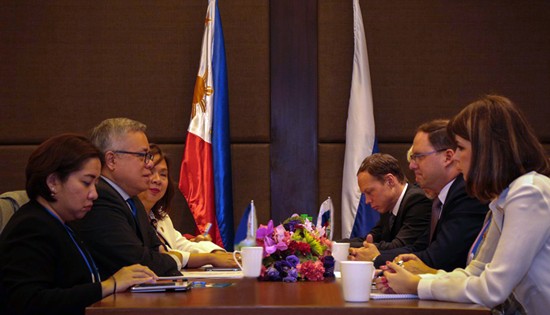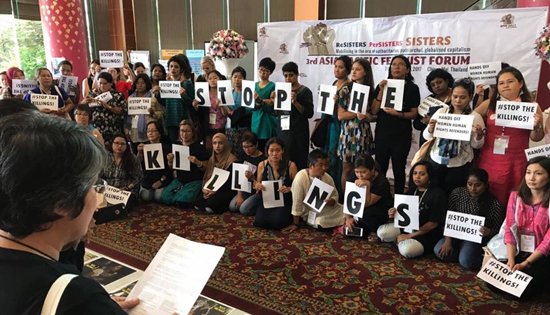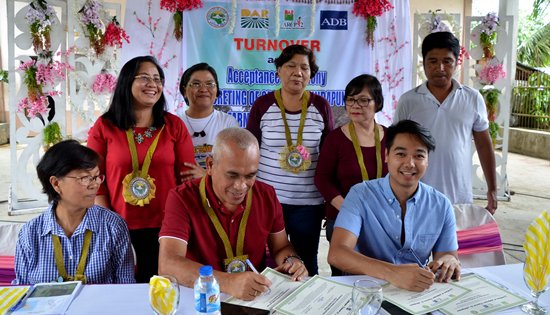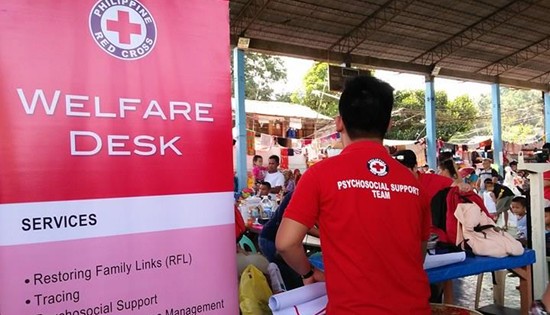Stronger
PH-Russia relations bank on complementarity

By
DTI-OSEC-PRU
September 15, 2017
MAKATI CITY – The
Philippine and Russia expressed intention to work closely to enhance
trade and investments relations, as well as to explore cooperation
areas of mutual interest, as both sides take advantage of the
complementarity in each other’s industrial strengths.
At the sidelines of the
Philippine hosting of the 49th ASEAN Economic Ministers’ (AEM)
Meeting and Related Meetings, Department of Trade and Industry (DTI)
Secretary Ramon Lopez, who also serves as the 2017 AEM chair,
convened a bilateral meeting with Russian Deputy Minister for
Economic Development Alexey Gruzdev on 11 September in Pasay City.
Both sides discussed
measures for enhancing bilateral economic relations arising from the
successful visit of President Rodrigo Duterte to Russia and the
inaugural meeting of the Philippine-Russia Joint Committee for Trade
and Economic Cooperation (JCTEC).
Sec. Lopez conveyed that
the Philippine initiative to engage Russia through the JCTEC is in
line with the present administration’s pursuit for an independent
foreign policy, securing collaboration with non-traditional
partners. Both sides agreed to conduct more business missions and
roundtable discussions with the private sector of both sides to know
more about each other’s business environment.
The Philippines reiterated
the commitment of Russian President Putin to source USD 2.5 billion
worth of agricultural products from the country.
Both sides affirmed the
importance of complying with respective sanitary and phytosanitary (SPS)
requirements for improved market access, as well as agreed to pursue
increased agricultural trade in line with the Memorandum of
Understanding (MOU) on Agriculture Cooperation signed during the
Presidential Visit to Russia in May 2017.
PH encouraged Russia to
explore the opportunities from PH industries particularly in
production and manufacturing, iron and steel, pharmaceuticals,
agriculture, oil and gas, energy, transport and infrastructure.
Graduating class
of Escuela Taller of Bohol ready to help restore earthquake-damaged
built heritage
Press Release
September 15, 2017
MANILA – On
September 15, Escuela Taller -Bohol holds the graduation of its
first batch of trainees. Among the special guests gracing this
momentous event is Cabinet Secretary Leoncio Evasco Jr., who is the
former Mayor of Maribojoc, the Spanish Ambassador to the
Philippines, H.E. Luis Antonio Calvo, and the Bishop of the Diocese
of Tagbilaran, Most Rev. Alberto S. Uy.
A total of 48 young men
and women completes the one-year training program in traditional
construction and conservation techniques for masonry, carpentry and
wall finishing. This group of young people are now part of a unique
pool of specialists and skilled workers in conservation aptly called
Heritage Protectors. They can now be tapped to help conserve and
restore the historical structures of Bohol that were ravaged by the
7.2 magnitude quake in 2013 and other heritage structures in the
region that consistently demand conservation works through
preventive maintenance. They will be soon be part of the
rehabilitation efforts within the Santa Cruz Parish Complex in
Maribojoc. The restoration of the church’s retablo, the repairs of
the stone steps leading to the rear side of the church and the
restoration of the old convent are among the many projects included
in their list of future undertakings.
According to ET Executive
Director Carmen Bettina Bulaong, “Escuela Taller’s mission in Bohol
is to equip the local youth with skills related to the conservation
of built heritage. This new skill set is not simply a means of
livelihood for these young men and women. It is their opportunity,
as members of a community, to actively participate in safeguarding
the legacy of a culture that they are so much a part of. This is our
shared mission with other Escuelas Taller in Spain, North Africa and
Latin America.” In fact to ensure the quality of their training, ET
has sent its finest graduates from Manila to become instructors in
the various trades and workshop areas that were established as a
response to massive damage due to the earthquake in October 2013.
Escuela Taller in
Intramuros was among the first organized groups who conducted
emergency response by conducting the assessment and documentation of
the damage caused by the earthquake. Eventually, ET's first
satellite training program, which was participated in by 28 young
Boholanos, was organized through the support of the Ayala
Foundation. The training involved the restoration of the Dauis Watch
Tower as the “learn-by-doing” project of the trainees. The Dauis
church complex, where the watchtower stands, is a declared National
Cultural Treasure by the National Museum and a National Historical
Landmark by the National Historical Commission of the Philippines.
After the satellite training program in Dauis and the completion of
the Dauis Watch Tower, Escuela Taller established its center for
training in Maribojoc Church Complex through the support of Senator
Loren Legarda and the National Commission for Culture and the Arts.
About Escuela Taller
Escuela Taller de
Filipinas Foundation, Inc. was organIzed in 2009 as a project by the
Philippine and Spanish governments through the National Commission
for Culture and the Arts (NCCA) and the Agencia Española de
Cooperación Internacional para el Desarrollo (AECID), the
international aid agency of the Spanish government. Today it is an
independent Filipino foundation and ET Bohol is its second training
center in the country after the pilot training center in Intramuros.
Women human rights
defenders in Asia and the Pacific say:
Stop the killings
in the Philippines now!

By
KARAPATAN
September 10, 2017
QUEZON CITY – More
than a hundred women from different countries in Asia and the
Pacific joined the #BlackFriday protest against extrajudicial
killings in the Philippines held last September 8, 2017, in
Chiangmai, Thailand, in the sidelines of the 3rd Asia Pacific
Feminist Forum (APFF) organized by the Asia Pacific Forum on Women,
Law and Development (APWLD).
“We, participants from the
Philippines at the third Asia-Pacific Feminist Forum, joined by our
sisters in the Asia-Pacific region, condemn in the strongest sense,
the unabated killings in the Philippines in the context of President
Rodrigo Duterte’s war against drugs and Oplan Kapayapaan,” they said
in a statement.
The women added
“State-sponsored killings in the Philippines have become
relentlessly horrendously, victimizing the poor and marginalized.
State-sponsored killings in the Philippines have become relentlessly
horrendously, victimizing the poor and marginalized. The latest
victims are: Kian Delos Santos, Carl Angelo Arnaiz, Reynaldo de
Guzman, Obillo Bay-Ao, Vaugh Carl M. Dicang, Luardo Yac, Oscar
Asildo Jr. and Jezreel and Dalia Arrabis.”
Shirley Tagi, artist and member of the DIVA for Equality in Fiji,
offered songs in solidarity with the Philippines. Women human rights
defenders from at least twenty countries (Thailand, Hong Kong,
Malaysia, Nepal, Indonesia, Timor Leste, Pakistan, India, Sri Lanka,
Kyrgyzstan, Myanmar, Fiji, Cambodia, Kazakhstan, South Korea,
Bangladesh, Vietnam, Solomon Islands, Papua New Guinea, and Laos)
participated in the said protest action.
“Thousands of poor people have been killed since President Rodrigo
Duterte came into power last year. Peasants and indigenous peoples
have been killed as Duterte continues to implement the State’s dirty
war against its perceived enemies. His war on drugs has resulted to
killings and gross violations on the right to due process in urban
poor communities. The climate of impunity has worsened, with
Duterte’s war on drugs and counter-insurgency program Oplan
Kapayapaan, promoting further unpeace,” they added in the statement.
“We demand an immediate end to the killings. We demand a transparent
and sift investigation on the killings! We demand that perpetrators
be held fully accountable!” they concluded.
On the last night of the APFF, Pres. Rodrigo Duterte won the
Insulting Intelligence award in the What The…Mock Poll by the APWLD
among the more than 350 participants of the forum. On the poll with
the question “Who displayed the most misogyny, sexism, homophobia or
transphobia and made a public statement that was illogical,
irrational or blatantly false?,” majority of the participants
answered Duterte, citing his authorised killing of 13,000 in the war
against drugs, declared martial law in Mindanao, ending peace talks
and encouraging the military to rape women amid the conflict.
Duterte “bested” other sexist government leaders in the Asia Pacific
region nominated such as Fiji Prime Minister Frank Bainimarama,
Indian State Minister Abu Azmi and Malaysian Parliamentarian
Shabudin Yahaya.
|

Leyte
Provincial Agrarian Reform Program Officer Renato Badilla
(seated, center) and Javier Vice Mayor Michael Dragon Javier
(seated, right) signs the turnover and acceptance documents
for the 2.64-kilometer concreted Odiong-Guindapunan road
implemented under the second phase of the Agrarian Reform
Communities Project (ARCP-II). |
DAR concretes
road, opens opportunities
By
JOSE ALSMITH L. SORIA
September 6, 2017
JAVIER, Leyte –
With the road leading to Barangay Guindapunan now concreted,
residents here can already eat fresh fish and avail of the various
government services.
This was the testimony of
Barangay Councilor Elizabeth Mendoza as she thanked the Department
of Agrarian Reform (DAR) and Mayor Leonardo Javier Jr. for
concreting the Odiong-Guindapunan road.
Guindapunan is situated on
top of Mount Mairig, some seven kilometers away from the town proper
in this fourth class municipality. Residents here used to ride in a
horse as their mode of transportation in the past as the place has
steep slopes, sharp curves and dangerous for other kinds of vehicles
especially on rainy days.
But with the said road now
concreted, this village is already accessible to all kinds of
vehicles. Hauling of farmers’ products is easier now and a lot of
opportunities were opened to residents here, said Simplicio Bahinti.
ARCP-II National Project
Manager Jean Fornoles disclosed that in 2010 Mayor Javier was among
the first and very few mayors who invested in the second phase of
the Agrarian Reform Communities Project (ARCP-II) when DAR
introduced it.
According to her, many
mayors turned down the offer for they found the share of the LGU in
the total project cost too big that they cannot afford to finance.
But Mayor Javier thought otherwise, Fornoles added.
Under ARCP-II, for a
fourth class municipality, the national government will provide only
40 percent of the project cost through a loan from the Asian
Development Bank (ADB), while the LGU will shoulder the remaining 60
percent.
Fornoles further disclosed
that Javier did not only commit to provide equity to one farm-to
market road but wanted six road projects, a road opening and five
road concreting, with an aggregate project cost of P84.5-million.
The concreting of the
2.64-kilometer Odiong-Guindapunan road was the second project
completed and was turned over recently by DAR Assistant Regional
Director Ma. Fe Malinao representing Regional Director Atty. Sheila
Enciso who was then out of the region.
The remaining four other
road projects are expected to be completed before the year ends.
During the said occasion
Malinao reminded the LGU and the recipient villages to maintain the
road in good condition within 10 years otherwise they will also be
shouldering the 40 percent share of the national government thereby
converting the grant into a loan.
In acceptance, Vice Mayor
Michael Dragon Javier in behalf of the mayor, as the latter was
recuperating after undergoing a kidney transplant, thanked DAR for
the assistance and assured “we will take care of this wonderful
gift”.
In his message, he
confirmed the stories of Mendoza and Bahinti as he himself witnessed
how hard life was in this area which resulted to the mayor (his
father) seeking the assistance of DAR through its Program
Beneficiaries Development (PBD) as there are 1,437 agrarian reform
beneficiaries (ARBs) here.
Meanwhile, Chief of the
PBD Division Melecia Ong explained that the six road projects are
also part of DAR’s commitment to the Regional Convergence Initiative
(RCI) with the Departments of Agriculture, Environment and Natural
Resources, and Interior and Local Government wherein this town was
chosen as the pilot area in Eastern Visayas.
Blood of slain
Lumad youth by CAFGU is on Duterte’s hand
By
SANDUGO
September 6, 2017
QUEZON CITY – Lumad
youth Obillo Bay-ao, 19, died 9:26 p.m. September 5, after eight
hours of fighting for his life at the Davao Regional Hospital in
Tagum City. Bay-ao was shot dead by a certain Ben Salangani, a
member of the Citizen Armed Force Geographical Unit (CAFGU), a
paramilitary group. He was a grade six pupil of Salugpongan Ta 'Tanu
Igkanogon Community Learning Center (STTICLC) in Sitio Dulyan, Brgy.
Palma Gil, Talaingod, Davao Del Norte.
“We mark Obillo Bay-ao’s
death with rage! It is another testimony to the mounting crimes of
the US-Duterte regime against the national minorities,” said Datu
Jerome Succor Aba, chairperson of Suara Bangsamoro and
co-chairperson of Sandugo.
Sandugo called for the
punishment of Bay-ao’s killer and the disbandment of the notorious
paramilitary group even as it holds the US-Duterte regime
accountable for the escalation of attacks against the national
minorities as part of its all-out war and counterinsurgency policies
and martial law declaration.
The national minorities –
the Moro and indigenous peoples – are the hardest hit by Duterte’s
martial law and all-out war. “Our people are being killed, harassed,
and almost wiped out by state attacks.” There are at least 29
documented victims of extrajudicial killings among the national
minorities from June 2016 to June 2017, excluding those killed in
the Marawi siege.
Yesterday, the Sandugo
second assembly indicted the US-Duterte for the intensifying fascist
attacks against the national minorities and the worsening landgrab
and plunder of resources in ancestral lands and territories, which
may now lead to ethnocide.
“The President – who
earlier recognized and promised to correct the hundreds of years of
injustice against the national minorities – now embodies national
oppression, which has caused the injustices to and oppression of the
national minorities,” the declaration stated.
The indictment came after
hearing the regional reports of various national minorities all over
the country. Some 2,500 national minorities from the Cordilleras,
Cagayan Valley, Central Luzon, Mindoro, Quezon,Tanay, Palawan, Panay
and the island of Mindanao are in Metro Manila for the assembly and
Lakbayan 2017.
Return ALL
ill-gotten wealth of the Marcoses, hold them accountable - Karapatan
Press Release
September 1, 2017
QUEZON CITY – “The
Marcoses have become legends among thieves and they used public
funds for their political and personal gains. All their ill-gotten
wealth should be returned to the people. We should be vigilant
against any compromise agreement of the Duterte administration with
the Marcoses that enables their getting a free pass for all their
crimes and their continuing political rehabilitation. This will only
perpetuate the injustices they committed against the Filipino
people,” said Karapatan Deputy Secretary General Roneo Clamor, on
statements of Pres. Rodrigo Duterte and Justice Secretary Vitaliano
Aguirre that the Marcoses will return some of their ill-gotten
wealth and that a compromise agreement is being arranged.
The Basel Institute of
Governance/International Center for Asset Recovery (ICAR) estimated
that around $5-$10 billion of Marcos ill-gotten wealth needs to be
recovered from Switzerland and the US. As of 2009, only $658 million
have been recovered.
Several compromise
agreements have been initiated by previous administrations. In 1993,
the Ramos government through then Presidential Commission on Good
Government (PCGG) Chair Magtanggol Gunigundo, entered into a 75%-25%
sharing agreement with the Marcoses. The Samahan ng Ex-Detainees
Laban sa Detensyon at Aresto (SELDA), a group of Marcos’ martial law
victims that led the filing of the class action suit against the
Marcoses in Hawaii, rejected the said arrangement as anomalous.
On September 13, 1995,
while Imelda Marcos was appealing and contesting the US Federal
Court decision before the US Court of Appeals in the class suit of
human rights victims, Atty. Robert Swift, the court-appointed
counsel of victims, and Gunigundo hatched a compromise agreement
accepting a $150 million monetary settlement, in exchange for the
dropping of the entire class suit. According to SELDA, Swift made
this unilateral move, without adequate, thorough and genuine
consultation with the victims. The martial law victims protested and
Pres. Ramos was then forced not to sign the agreement.
On December 9, 1998, under
the Estrada administration, the Philippine Supreme Court declared
the December 28, 1993 agreement invalid, under which the PCGG had
agreed with the Marcoses on a 75%-25% (75% for the PH government,
25% for the HR victims) split in the $150 million settlement. In
February 1999, after SELDA’s opposition before the US Hawaii Court
Judge Manuel Real on the said settlement, Real finally nullified the
$150 million compromise settlement agreement.
Under the Gloria Macapagal
Arroyo administration, in 2004, P544 million were used by Arroyo and
the Department of Agriculture, in the DA’s fertilizer program, which
was exposed as a scam, and serious allegations were made on the
Arroyo’s diversion of said funds to her presidential campaign.
“Almost all
administrations have worked in cahoots with the Marcoses to absolve
them of their grave crimes against the people, and to line up their
pockets with a few millions. With Duterte’s facilitation of the
political rehabilitation of the Marcoses, through the hero’s burial
of dictator Ferdinand Marcos and political horsetrading with the
Marcos family, it is very important that the Filipino people,
especially the martial law victims and their families, keep a close
watch on what transpires between the Duterte administration and the
Marcoses,” Clamor concluded.
“Return every
centavo of it, but plunderers and criminals they remain,” SELDA says
of reported Marcoses’ return of ill-gotten wealth
Press Release
August 30, 2017
QUEZON CITY – “The
Marcoses should return all ill-gotten wealth, every centavo of it,
but plunderers and criminals they remain.”
Thus said Danilo dela
Fuente, Marcos’ martial law victim and spokesperson of SELDA (Samahan
ng Ex-detainees Laban sa Detensyon at Aresto), reacting to
statements by Pres. Rodrigo Duterte that the Marcoses will return
some of their ill-gotten wealth.
“But for us, martial law
victims, this does not mean absolution from their crimes of plunder,
human rights violations and massive corruption. We see this as a
token and deceptive gesture of a family seeking to complete their
political rehabilitation,” said dela Fuente.
Dela Fuente is one of the
named plaintiffs in the class action suit filed against the Marcoses
in Hawaii in 1986. US Federal Courts upheld that the Marcoses are
accountable for grave human rights abuses under the Marcos 21-year
reign.
“The Marcoses should be in
jail for their crimes against the Filipino people and for the
destruction and plunder of the economy they have committed for 21
years. They should not go scot-free. The political accommodation and
rehabilitation by the Duterte government is unacceptable,” added
dela Fuente.
Selda said the fact that
the Marcoses continue to weave a string of lies means this alleged
plan to return ill-gotten wealth is part of their unfinished scheme
to return to power in Malacanang, through the dictator’s son
Bongbong Marcos.
“This seemingly new
development is, in fact, hideous and doublespeak. They continue to
deny that this amassed wealth is ill-gotten, and even have the gall
to make up stories again and again. They plundered the country and
made the economy worse as ever before. Their continuous denial of
the plunderous reign of the Marcoses is the reason why we shouldn’t
be plainly accepting these statements,” said Dela Fuente.
The group urged Pres.
Duterte to disclose details of what seemed like “negotiations” with
the Marcoses.
“The president should stop
speaking on behalf of the Marcoses and disclose to the people
whatever has transpired in these talks. Duterte should not think the
people have forgotten how he and the Supreme Court have allowed a
hero’s burial for Marcos. He should be wary of the people’s
protest,” dela Fuente.
In the end, the Marcoses
should be made accountable for their crimes of plunder. This
development will in no way exonerate the Marcoses’ crime against the
people.
“It seems like a fix
designed to fool the martial law victims and the people to make the
plunderous and murderous Marcoses look like benevolent family to
complete their rehabilitation and revision of history,” said dela
Fuente.
SELDA rejects the alleged
settlement by Duterte and the Marcos family and their justifications
as to why they hid the loot.
“Not in the name of the
victims of martial law, not in the name of the people who demand
justice for the Marcoses crimes against the people that Pres.
Duterte is acting like a stooge of the dictator’s family. Never
again,” said dela Fuente.
Marawi’s missing:
Red Cross website helps reunite families

By
ICRC
August 30, 2017
MANILA – It has
been more than three months since fighting broke out in Marawi City,
in Lanao del Sur province, but for families whose loved ones are
still missing, the wait seems never-ending. In an effort to reunite
these families, the Philippine Red Cross (PRC) and the International
Committee of the Red Cross (ICRC) recently launched an online page
(https://familylinks.icrc.org/Philippines) that helps trace missing
persons. On the occasion of the International Day of the Disappeared
(30 August), the ICRC wishes to draws attention to the plight of
these families and stresses that people have a right to know what
happened to their missing relatives.
Camilla Matteucci, head of
the ICRC team working with the PRC to reunite families in the
Philippines, said there are many possible causes of separation
during a conflict situation. “People could be trapped by the
fighting, detained or even killed. They could be in an evacuation
centre but not have the means to contact their kin. At the end of
the day, it’s important to remember that families have a right to
know what has happened to their loved ones, and wherever possible,
be reunited with them. Our tracing website offers a platform for
people to share information about their missing relatives and
request our help in tracing them.”
The website supplements
existing tracing services such as the 12 PRC welfare desks in
evacuation centres in Marawi and Iligan cities. The information
shared by families with the Red Cross remains confidential. Since
the beginning of the Marawi conflict, the Red Cross has received 402
tracing requests, 179 of which are still being looked into.
Aisha (not her real name),
whose husband went missing in Marawi, said: “With each day that the
fighting continues, our hope diminishes. We praise Allah if my
husband is still alive. But if he is dead, then we need to recover
his remains so that we can bury him according to our religion and
traditions. Every Maranao family looking for a loved one wishes for
this.”
Reuniting families in
times of conflict or disaster is a key service that is always
provided by the International Red Cross and Red Crescent Movement.
In Marawi, the ICRC and the PRC have been providing technical and
material support to help the authorities manage dead bodies. Besides
this, the PRC has provided psychosocial support to more than 10,400
people, including children, affected by the conflict.
The ICRC is a neutral,
impartial and independent humanitarian organization whose
exclusively humanitarian mission is to protect the lives and dignity
of victims of armed conflict and other situations of violence and to
provide them with assistance. The ICRC also endeavours to prevent
suffering by promoting and strengthening humanitarian law and
universal humanitarian principles.